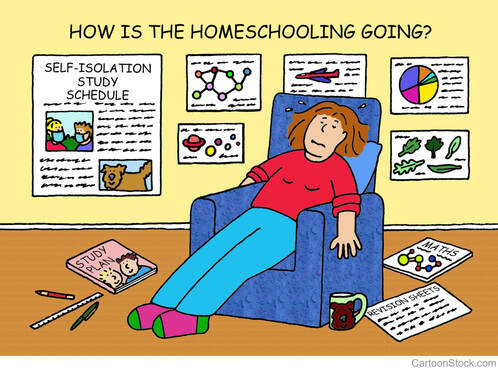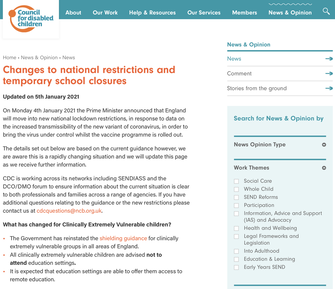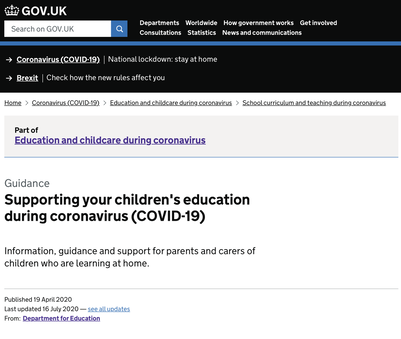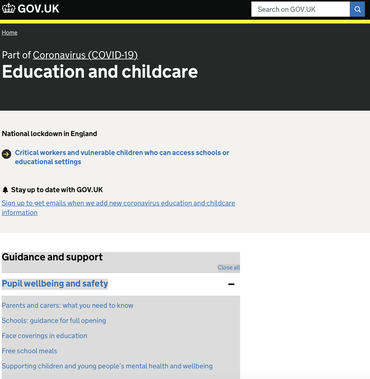|
by Douglas Silas,
Specialist SEN solicitor 11/1/2021
So we’re back into another ‘lockdown’ again!
It feels like March 2020 again doesn’t it? Although this time we should probably feel better prepared than the first time. But it’s back to homeschooling and online learning for children and young people, with many exhausted parents trying to teach their children once more (some whilst still working) . I recall a popular joke going round last Spring/Summer about homeschooling with a child reported as saying: ‘My teacher this year is not very good, I hope that I don’t have them next year!’ Makes you think, doesn't it? Anyway, as I realise that there are many people again out there with difficulties or limited time (and I know parents of children and young people with SEN often have it doubly or triply hard), I have decided to once more try and do my bit to support everyone. So I am starting up my weekly updates once more, to try and help parents and professionals or save them precious time from having to look for things themselves, by signposting them to news or information that I find. I hope that this helps people again.
Don’t forget, to ensure that you never miss one, you can get my SEN Updates personally by completing your email details above,
or by following me on one of the social media platforms I use (i.e. Twitter/Facebook). You can also share this SEN Update with others (please only do so if it may be relevant to them) by using one of the icons, usually to the right or at the bottom of this page.
The first thing I want to clarify here is what the new 'lockdown' rules actually mean for pupils.
The best summary that I have found is on the website of the Council for Disabled Children (CDC) on a page entitled: 'Changes to national restrictions and temporary school closures' (updated on 5/1/2021), which states as follows: "On Monday 4th January 2021 the Prime Minister announced that England will move into new national lockdown restrictions, in response to data on the increased transmissibility of the new variant of coronavirus, in order to bring the virus under control whilst the vaccine programme is rolled out. The details set out below are based on the current guidance however, we are aware this is a rapidly changing situation and we will update this page as we receive further information. CDC is working across its networks including SENDIASS and the DCO/DMO forum to ensure information about the current situation is clear to both professionals and families across a range of agencies. If you have additional questions relating to the guidance or the new restrictions please contact us at [email protected]. What has changed for Clinically Extremely Vulnerable children?
What has changed for schools and colleges?
Who can continue to attend school and college? The Government states that: “the problem is not that schools are unsafe for children – children are still very unlikely to be severely affected by even the new variant of Covid. The problem is that schools may nonetheless act as vectors for transmission, causing the virus to spread between households.” Children and young people can continue to attend school or college if they:
In practice, to ensure high quality education for children and young people who need to continue to attend school or college, this may require creative approaches from settings including consideration of staffing rotas and blended remote and face to face learning based on the individual needs of children, young people and their families."
I would also like to remind you that the Government still has a page up on its website entitled: 'Supporting your children's education during coronavirus (COVID-19)', which is still useful (although it was last updated in July 2020), which states as follows:
"This page and information for teachers will be updated regularly to include further resources and reflect the latest information and developments. While staying at home due to coronavirus, parents and carers may be worried about their children’s development and the effect of missing school or nursery. No one expects parents to act as teachers, or to provide the activities and feedback that a school or nursery would. Parents and carers should do their best to help children and support their learning while dealing with other demands. Get specific advice on how education can continue at home for children:
Alongside any work your children receive from school, you can try using online educational resources covering various subjects and age groups. Educational programmes to help children learn at home are available from the BBC. Have regular conversations about staying safe online and tell your child to speak to you if they come across something worrying online. Mental health and wellbeing The change of routine and staying at home may make this a difficult time for some children. Public Health England has published advice on how to support your children’s wellbeing during the coronavirus outbreak. Guidance is also available to help you look after your own mental health. Advice on helping children continue their education during coronavirus Help children aged 2 to 4 to learn at home during coronavirus (COVID-19) Information on making child development a part of everyday life and play. Help primary school children continue their education during coronavirus (COVID-19)How to provide support and feedback and structure the day. Help secondary school children continue their education during coronavirus (COVID-19)How to help your child organise their time. Help children with SEND continue their education during coronavirus (COVID-19)Resources designed to support special educational needs and disabilities.
And, although I know that it isn't strictly focused on SEN, as I know that parents and professionals also have or are involved with other children and young people, I want to also signpost you to another page on the Government's website entitled: 'Guidance and support', which further signposts you to additional information, which states as follows:
"Pupil wellbeing and safety
Testing in schools, colleges and universities
Home learning during coronavirus
Exams and managing a school or early years setting - Exams and assessments - Managing a school or early years setting
- Recording attendance - Childcare, holiday clubs, and after school care - Working safely Funding and support for education and childcare
University students and higher education
Where can I find further information?
Aside from clicking on the relevant links for more information, I would again remind you of the very useful resources and information provided on the following websites:
- IPSEA - Council for Disabled Children - Contact - Scope - Special Needs Jungle I would also highlight again the fact that you can now get digital copies of the magazines: SEN Magazine and Autism Eye which are both very helpful to any parents or professionals involved with children/young people with SEN
Keep safe until next week.
With best wishes Douglas
P.S I understand that there are a number of educational or other useful resources now on the web, so I would be very grateful if you could let me know of any that you find that other people may find useful, so that I can direct people to it.
How useful do you find my SEN Updates?
Created with Quiz Maker
Comments are closed.
|
Archive
March 2022
|
© Douglas Silas Solicitors 2005-24
Authorised and Regulated by the Solicitors Regulation Authority (SRA no: 643718)
‘Douglas Silas Solicitors’ is the trading name of ‘Douglas Silas Solicitors Limited’, a limited company registered in England & Wales (company no: 10689991), whose registered office is Gable House, 239 Regents Park Road, Finchley, London, United Kingdom, N3 3LF. A list of members/directors may be inspected at our office.
Authorised and Regulated by the Solicitors Regulation Authority (SRA no: 643718)
‘Douglas Silas Solicitors’ is the trading name of ‘Douglas Silas Solicitors Limited’, a limited company registered in England & Wales (company no: 10689991), whose registered office is Gable House, 239 Regents Park Road, Finchley, London, United Kingdom, N3 3LF. A list of members/directors may be inspected at our office.






 RSS Feed
RSS Feed







